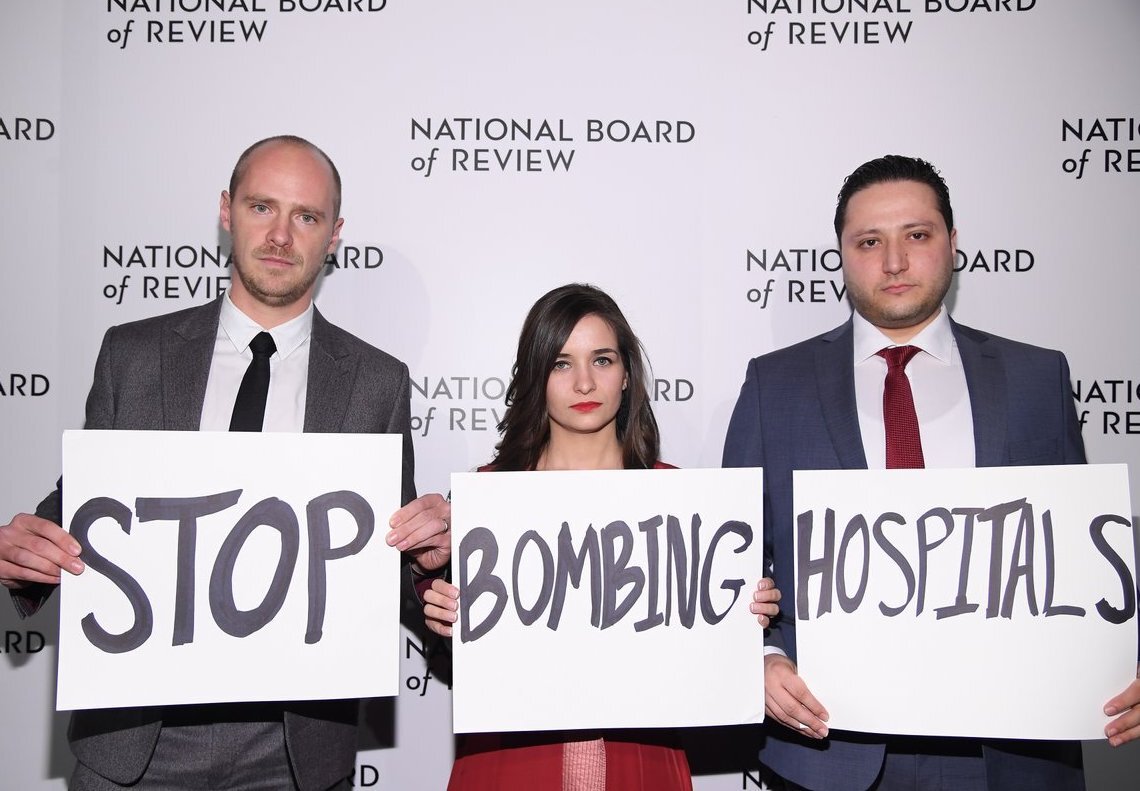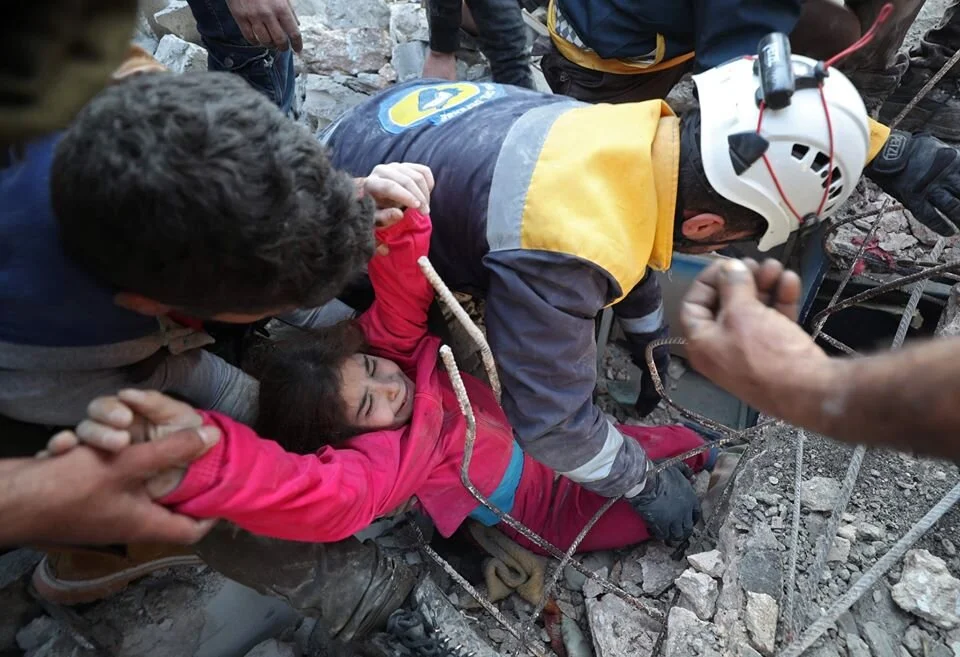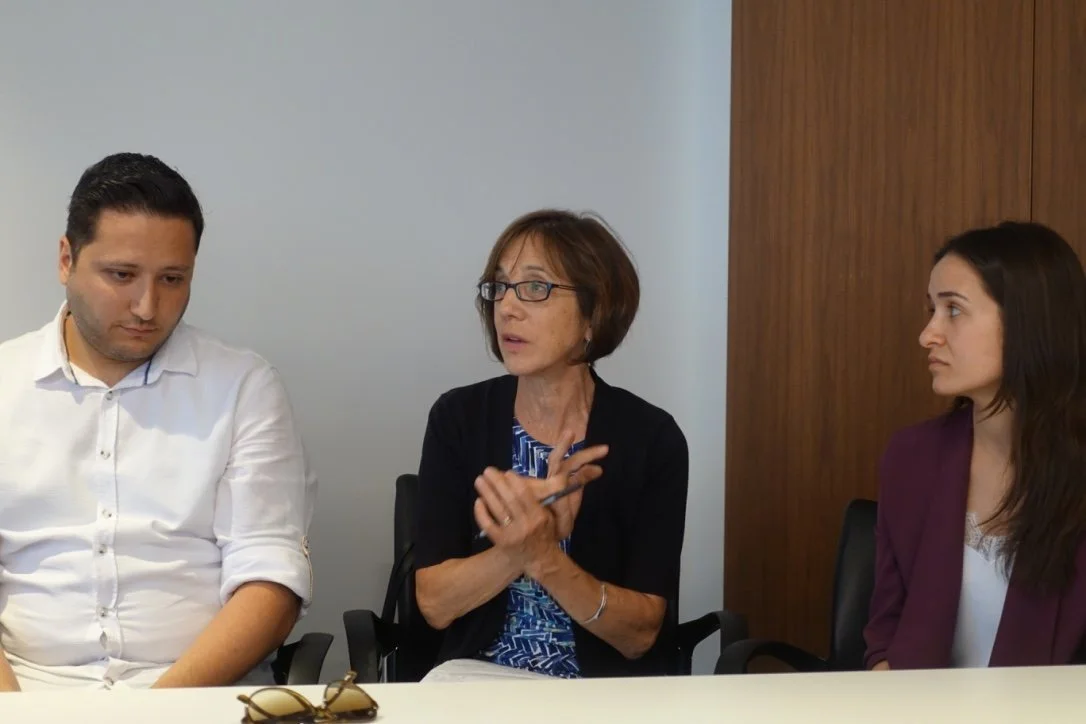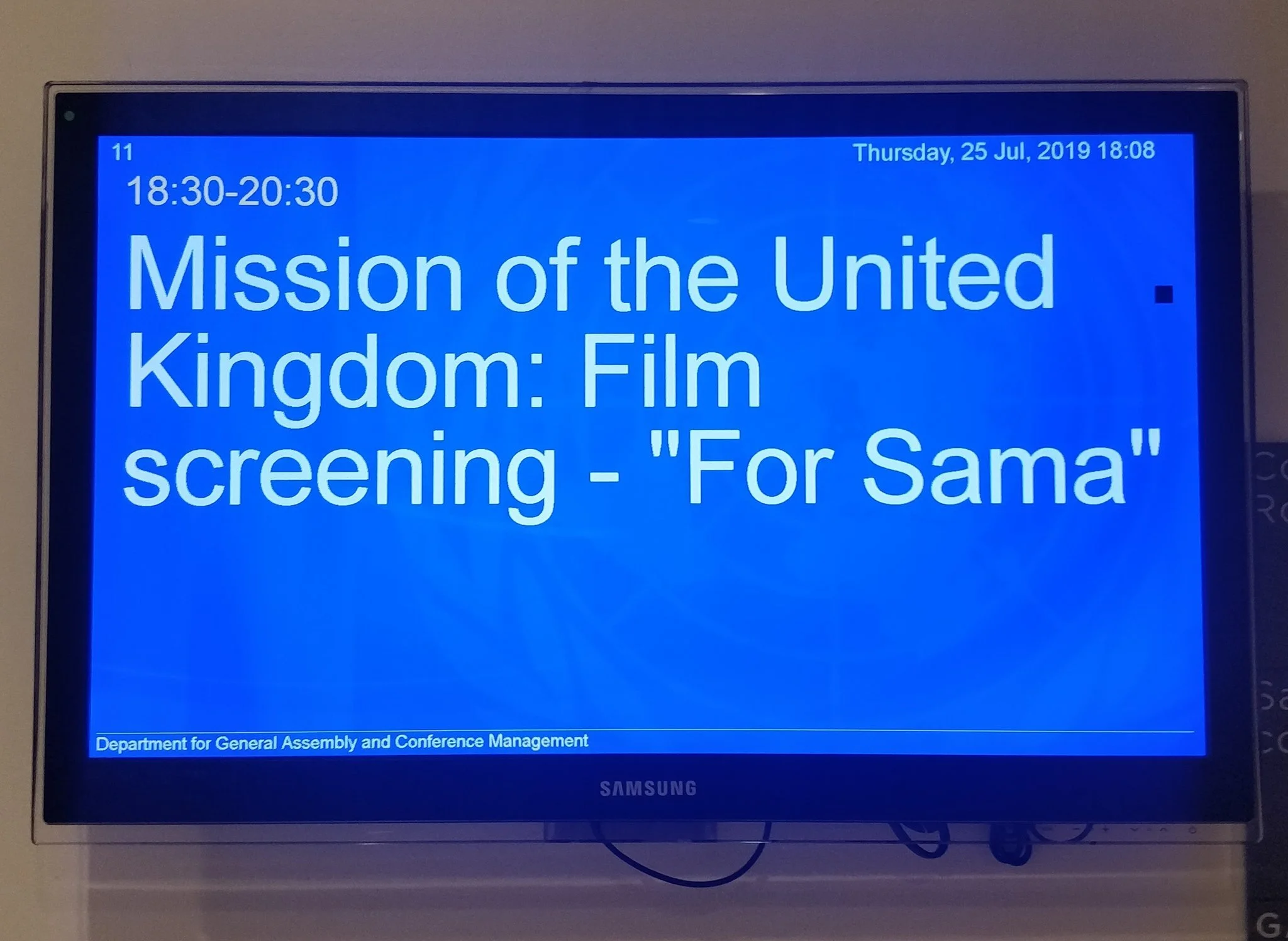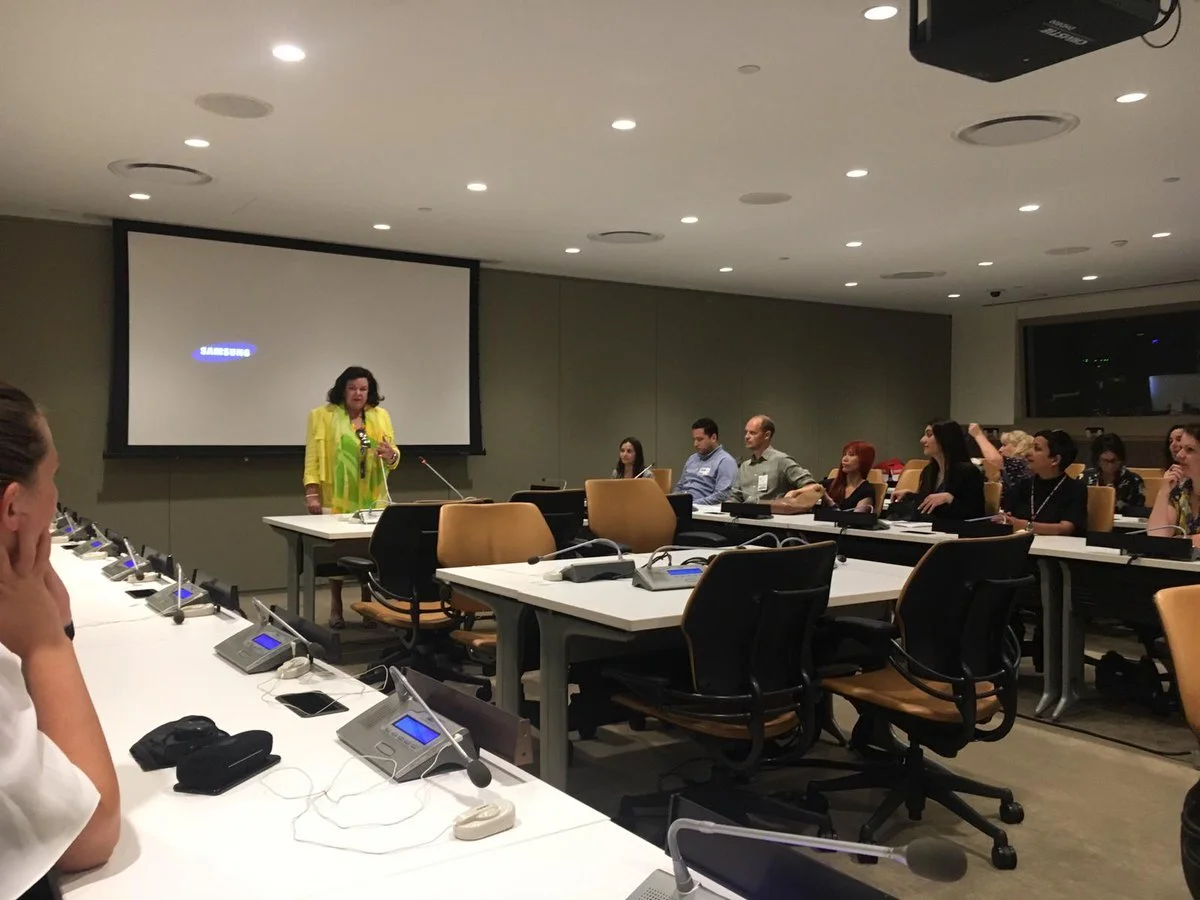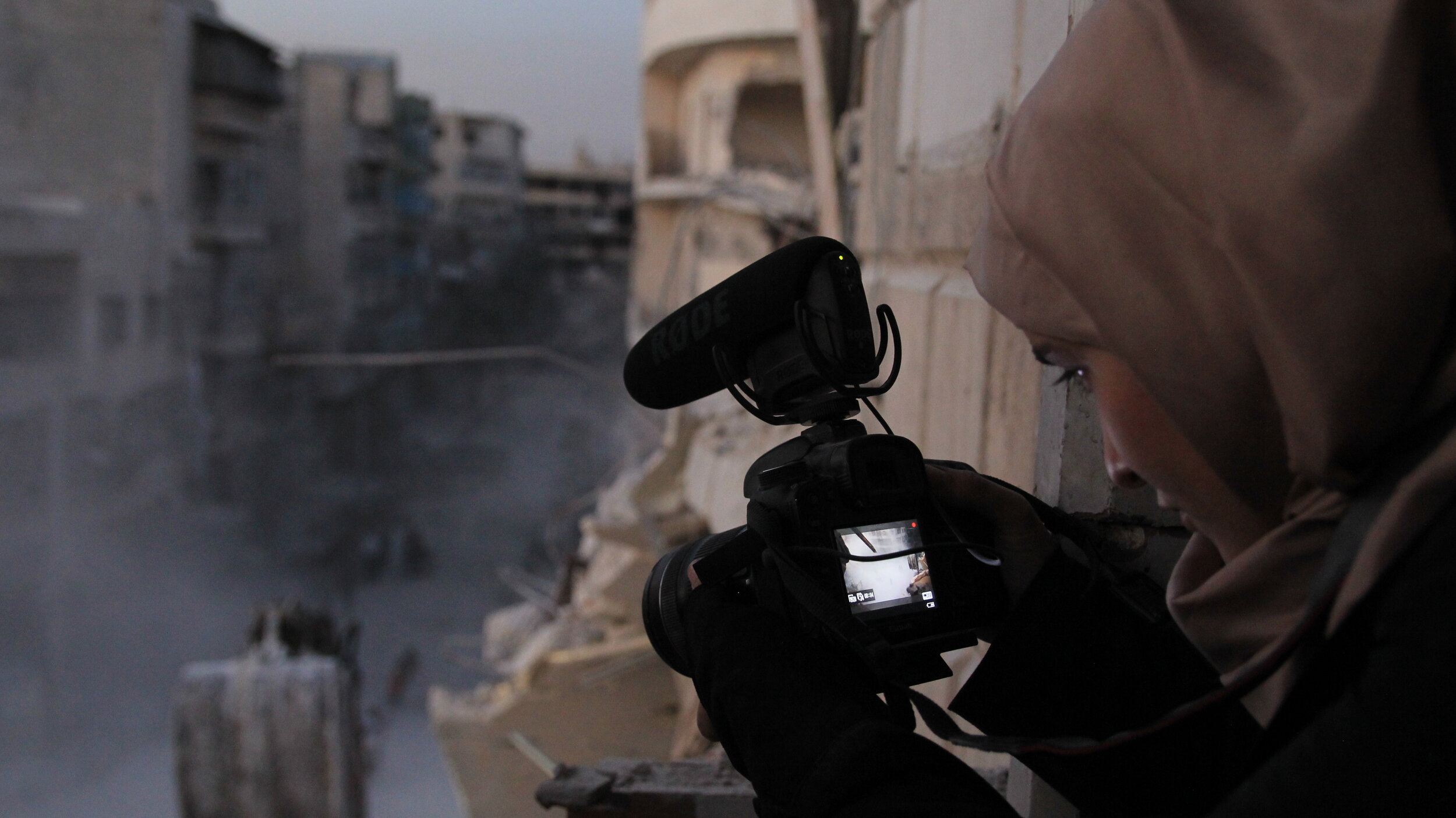
NEWS
Waad al-Kateab Delivers STOP BOMBING HOSPITALS message at UN
Today, Waad al-Kateab took her STOP BOMBING HOSPITALS message straight to UN HQ in NYC. While touring her Oscar-nominated film ‘For Sama’, Waad joined forces with a coalition of NGOs to deliver a critical message about the international community’s failure to act to stop the killing in Syria.
The scenes captured in ‘For Sama’ in Aleppo are still happening today in Idlib: hospitals are being targeted, entire families killed and hundreds of thousands have been driven from their homes. And the world remains silent.
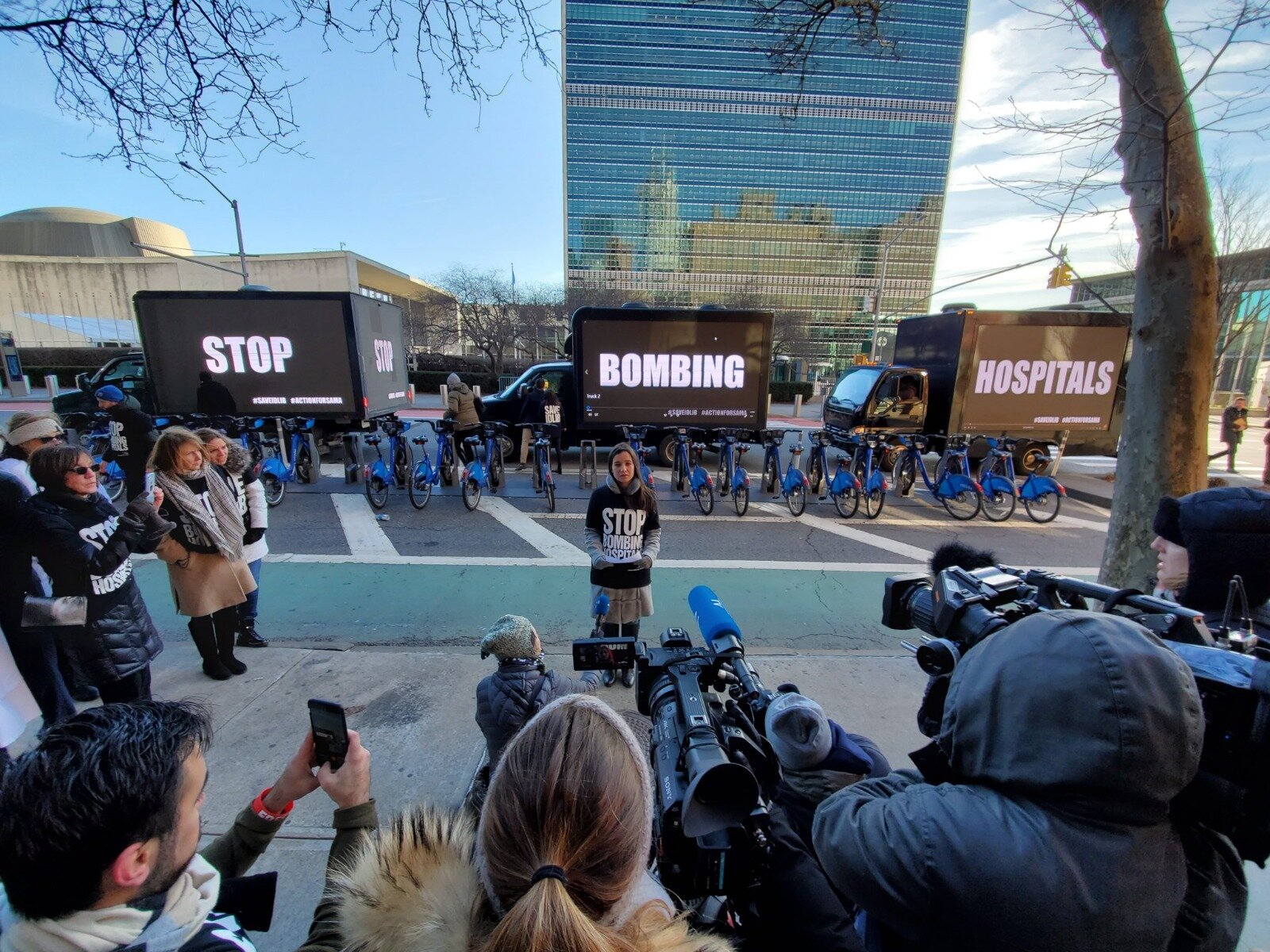



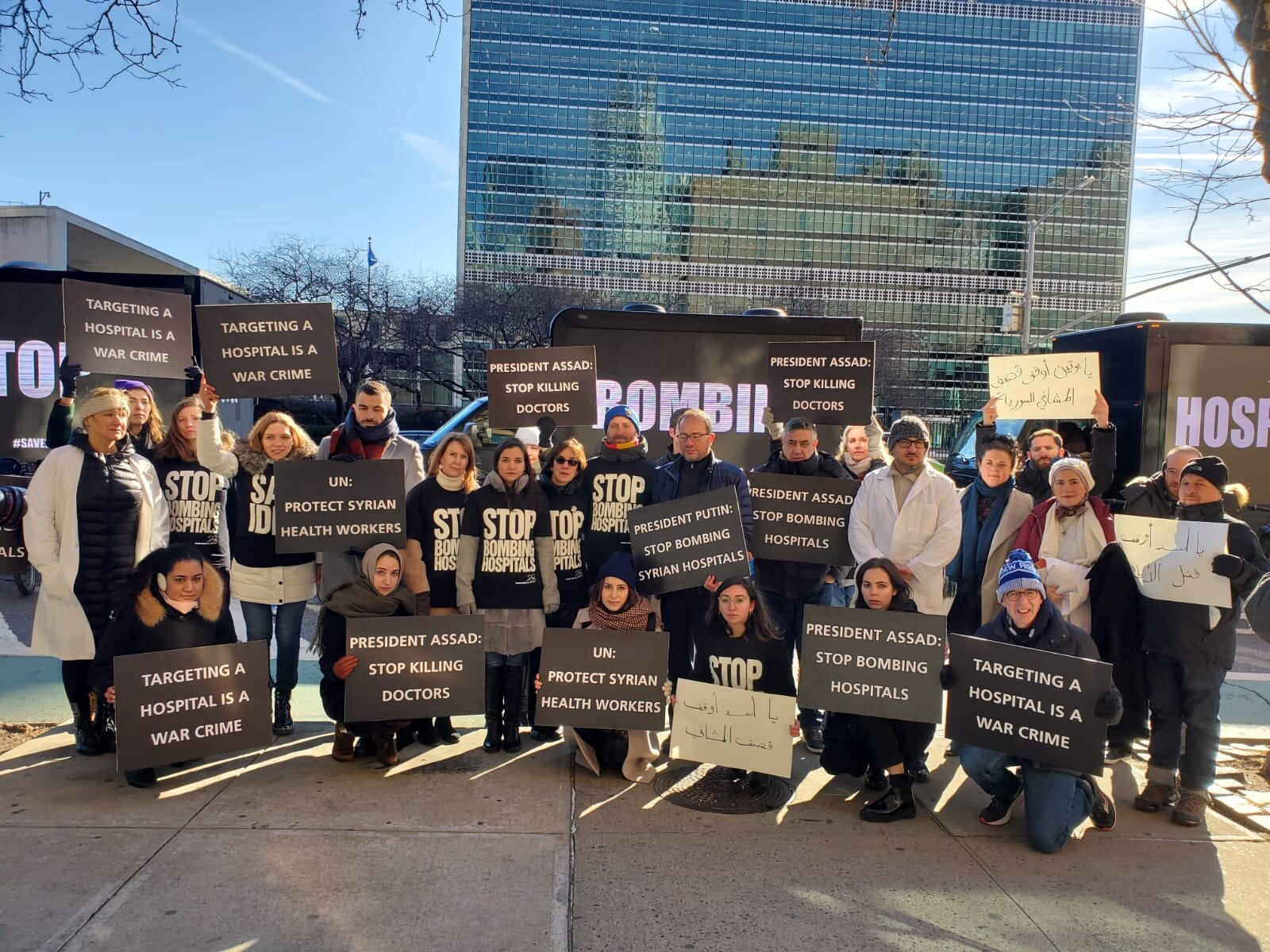

Set against the backdrop of UN HQ, Waad stood in front of billboard trucks “STOP” “BOMBING” “HOSPITALS,” (rotating in English, Russian, and Arabic), to share poignant, powerful messages from doctors on the ground in Syria...
“My brother’s house was targeted and hit directly by three back-to-back airstrikes. He and his wife Salem, injured in the attacks, lost their children: five-year-old Jenna, three-year-old Safaa, and one-and-a-half-year old Mohammed. Salem was in her first trimester when the attack happened and lost her unborn child. First responders worked for two hours to evacuate my brother and his wife from the devastated remains of the house. Both of them had sustained severe injuries all over their bodies. My brother was taken to one of the border hospitals for treatment to his spinal cord.”
““I hope in 2020, when I wake up in the morning and read the news, I don’t read about dismembered children. I hope our children will go back to school and live a normal childhood like any other child.” ”
““Being a medical worker in Syria is extremely challenging. I’ll never forget the day our hospital was targeted twice in one day. That day I was in the hospital. We had to pull ourselves together and keep going to save as many lives as possible.” ”
““When we treat the displaced during one of our response efforts, we have mixed emotions. On the one hand, we are happy to provide medical services to our patients, but at the same time we are saddened by the fact that they were forced to leave their homes.” ”
“ For Sama is not just a film for me. It is my life. I survived for a reason, and through my filmmaking, I was able to give a platform to Syrian civilians being killed silently.” said Waad. “I am here to remind the international community that hospitals are not targets, children should be protected and no-one should have to flee their home.” #stopbombinghospitals #actionforsama
Afraa’s Story: Through For Sama our voice has finally reached people
So many of our colleagues and friends, who were such a big part of our lives, were also a big part of For Sama. We want to share some familiar faces from the film with you: where they are now, their memories of Aleppo and what they hope For Sama can share to the world about Syria.
Here’s Afraa’s story...
My name is Afraa, I’m 38 years old and I live in Gaziantep. I used to work in the education sector before the revolution, and I currently work in the protection of women and children for an NGO.
In Aleppo, I participated in the peaceful movement. After Aleppo went out of the Assad regime’s control, I decided to stay in order to provide any kind of help to the people, in particular the children. I participated in opening a series of schools in Aleppo. I was an education supervisor for a group of schools and I also worked in the field of psychosocial support. I did a lot of other volunteer positions, too, for example organising parties and activities for children like coloring the “Freedom bus” as well as graffiting on walls and establishing a theatre team for children, writing plays and training them how to act on the theatre stage.
I was a part of the family you saw in the film, which represents everything I adore in the world. This family eases my pain and my loss.
For me, the film is our eyes which witnessed all kinds of horror, sorrow, fear, joy, resilience, and optimism we felt in Aleppo. The film is what’s left of the memory of Aleppo, through the film we still remember what our homes and the streets used to look like, and if someday I lose my memory and become sick of Alzheimer's, my children will show me the film so I can watch myself, my family, and all the things I love.
I received a lot of positive messages, and a lot of questions like, “How can you still laugh and smile despite everything you went through?”
The most overwhelming message I received was when someone told me “I can’t stop thinking about you”. Our voice has finally reached people and explained that we’re normal people, we love, we laugh, we sing and colour. We just need a little safety, dignity, freedom, and a small land to shelter us.
My wish for the people who watched the film is that they try to stop the bloodshed in Syria, help prevent another forced displacement from taking place, and support our right to a volunteered and safe return, which can’t happen while this regime is still in power.
I also want people to know that people of Idlib are now being subjected to the same suffering you saw in the film, I want you to imagine that it might have been me there now, still suffering. Idlib became home to a lot of previously displaced people from all around Syria, and it would be an outrageous crime if they were to be forcibly displaced again.
Salem’s Story: Someday we'll return to build our country again, with love
So many of our colleagues and friends, who were such a big part of our lives, were also a big part of For Sama. We want to share some familiar faces from the film with you: where they are now, their memories of Aleppo and what they hope For Sama can share to the world about Syria.
Here is Salem’s story.
Hello, I am Salem and I live in Gaziantep, Turkey.
The point of the revolution for me is to love all people, to ease their pain, to try to fight oppression and to build a better future for us and for our children. It is also to show the difference between Assad’s rule with all the horror, fear, injustice, and between the revolution’s principles and putting the neglected community in charge of their responsibilities.
I participated in the peaceful demonstrations in Aleppo in 2011 and I started working in the civil society around the middle of 2012. It was then that we started cleaning our city when the regime withdrew all kinds of civil services from the city. I participated in founding the local community council of Aleppo city. I worked in education and relief, and I put my previous work expertise in the civil registry to work by creating a similar system in Aleppo and its suburbs, to provide people with identification papers and such. I participated in all kinds of civil activities to support the people’s resistance, together with my lifetime companion, my wife Afraa. We shared joy and sadness with our children, with our friends Hamzah, Waad, Abd Al-Fattah, Milad, Mahmoud, and Abdoullah.
One time in Aleppo, when we had invited our friends over for dinner, a warplane dropped an exploding barrel right on the building directly adjacent to ours. The building turned to ruins and our house was partially damaged - the windows and doors got moved, a hole cracked through the wall. My wife came home horrified until she realized that it wasn’t our house that blew up. She was determined not to let fear control the atmosphere, so we cleaned up the debris and the dirt, we cooked the meal and then our friends showed up and it was a nice night.
There is another moment that represents how we used to create happiness with our own hands during the siege and all the shelling, barrel bombs, missiles, and horror everywhere. Our friends, along with my wife and children, all gathered together in secret. They called me and told me to come hang out, so I knocked on the door and entered the room, then all of the sudden they turned all the lights off and everyone came into the room holding a cake, singing “Happy birthday to you”. I almost cried. This was the first time ever that I’d been thrown a surprise birthday party, especially the cake, which because of the siege, Waad had even managed to make without eggs.
For Sama is our message to the world to not to give up its responsibilities. The film captured an important part of our emotional swings such as between hope and desperation; between courage and fear. We laughed when we were supposed to cry, sometimes it was the other way around, but no matter what, we always loved our country, we loved its people, and we held onto it as much as we could. We still believe that someday we’ll thrive and we’ll return to build our country again with love, and only with love.
More than 20 killed in air raids on Idlib by the regime
At least 21 people have been killed in Syria's rebel-held Idlib province as Syrian government forces and their Russian allies intensified an air offensive on the country's northwest, according to rescue workers who operate in opposition-held areas.
The Syrian Civil Defence, also known as the White Helmets, said air raids and barrel bombs on Wednesday struck a vegetable market in the town of Ariha, as well as repair workshops in an industrial area, a few hundred metres away from the market.
At least 19 people were killed in the attacks on the market and the nearby shops, including a Civil Defence volunteer, Ahmed Sheikho, a spokesman for the group, told Al Jazeera.
A man was also killed in the village of Has as a result of a Syrian government air raid, Sheikho said, while a young girl succumbed to wounds sustained in a previous attack, which took place before the latest ceasefire was implemented.
The least 82 people were wounded in the attacks on Wednesday and the death toll is likely to increase, according to the White Helmets.
21 innocent people have lost their lives today, and 82 others have been injured, as a result of the regime/Russian terrorist attacks on #Idlib and #Ariha market and many other places in northern #syria. The number of dead will climb as many are critically injured. pic.twitter.com/OSbgkynMz2
— The White Helmets (@SyriaCivilDef) January 15, 2020
The bombardment engulfed several vehicles in the industrial zone, leaving the charred corpses of motorists trapped inside, an AFP news agency correspondent said.
Mustafa, who runs a repair shop in the area, told AFP he returned to find the shop destroyed and his four employees trapped under the rubble. It was not immediately clear if they had survived.
"This is not the neighborhood I left two minutes ago," Mustafa said.
People inspect destruction caused by government air raids in the town of Ariha, Idlib province [Ghaith Alsayed/AP Photo]
The attacks come days after a brief lull. The ceasefire brokered by Moscow, which supports the Syrian government, and Turkey, which backs the rebels, faltered on Tuesday night when air raids hit a string of towns in the southern part of Idlib province.
Since December 1, around 350,000 people, mostly women and children, have been displaced by the renewed offensive, the United Nations said on Thursday.
Sara Kayyali, a Syria researcher for Human Rights Watch, said nearly four million civilians are "essentially trapped" in Idlib due to the relentless bombardment.
"It's likely that many of these attacks on protected civilian infrastructure, where there is large civilian presence and no real military target, are likely to be war crimes," Kayyali told Al Jazeera.
The northwestern region is home to nearly three million people, about half of whom were transferred there in large groups from other parts of the country which had been held by rebels and were retaken by pro-government forces.
For Sama Nominated for Best Documentary Feature at the Oscars
We are thrilled to announce that For Sama has been nominated for Best Documentary Feature at the Oscars! This nomination provides an even larger platform for us to be able to discuss the aims of the Action For Sama campaign with millions of people around the world.
We wish to congratulate the filmmaking team and their partners at Channel 4 News, ITN Productions, Republic Film Distribution & Frontline PBS. This recognition is so incredibly well deserved.
Watch the team celebrating when the news came in:
The second when the great news came:
— Waad Al-Kateab (@waadalkateab) January 13, 2020
For Sama made it to#Oscar2020
Thanks for everyone who opend his life to me and my Camera and also thanks for everyone who helped us and gave us lots of love though this long journey from Aleppo 2011 to the great team here today.@forsamafilm pic.twitter.com/b6kLExYNTy
For Sama was made to share the truth about what's happening in Syria and Action For Sama was launched to help spread the word even further.
Please support the heroic efforts of the humanitarians and medics still saving lives and donate to our partners at Help Refugees.
The United Nations is investigating the criminal targeting of hospitals and medical facilities in Syria. Join us and Physicians for Human Rights in telling the UN Secretary-General to make the findings public and name the perpetrators. Sign the petition here.
Thank you, as ever, for your support.
UN BOARD OF INQUIRY ON THE BOMBING OF HOSPITALS IN SYRIA IS FAILING OUR PEOPLE
By Waad al-Kateab
Attacks on Syria - my home - continued over Christmas. Civilians are being killed, families are being broken apart, homes are being destroyed. We see no end to these horrific attacks but we try everything to make them stop. We stand with our people in Syria, we raise our voices for them. We urge people to take notice of what is happening and we demand that the war criminals responsible are held accountable.
But the UN doesn’t hear us. The UN ignores us.
We’ve heard about the UN’s Board of Inquiry to investigate attacks on health care facilities in Syria. At first, we were so relieved and happy to hear that an investigation into targeted Russian and Syrian regime bombings of UN-sponsored facilities, including over 50 medical facilities in the past 9 months, would finally lead to serious accountability. But our hopes crashed when we learned that they are only looking into 7 of the attacks. Only one of these is suspected to be a Russian attack. We also feel frustrated that the final report may not be made public. This inquiry is not accurate. These results will not represent the reality of what is happening. I’ve seen it with my own eyes and it has been proven by the New York Times. If there is evidence of what is going on in Syria then why are the UN ignoring this? This is not justice for us.
By keeping the results secret and by not even trying to show who is to blame for these attacks on hospitals, the UN is failing Syrians and failing its role as an international organisation. It is also totally unacceptable that Russia is trying to hide the findings of the enquiry and that the UN is weak enough to let this happen. We need all of the facts. We need to uncover and condemn the war criminals once and for all.
My heart breaks for Syria and my people but right now we have to turn our despair, anger and tears into power. We must put pressure on the UN. I demand that Secretary General António Guterres shares what the Board of Inquiry has found with the public. I demand that the UN does not give in to pressure from Russia and the Syrian Regime to discredit the investigation. I demand that the UN does not help them to escape accountability for the horrors they are committing in Syria.
Please help us take action.
Our friends at Physicians for Human Rights have launched a petition to demand the findings are made public and the perpetrators named.
You can also share my message as much as possible. Tag the UN and Secretary General António Guterres to make him take notice.
Twitter: @antonioguterres @UN
Facebook: /unitednations
Instagram: @antonioguterres @unitednations
We will not be silenced and we will not be ignored.
Waad al-Kateab
…
Read this critical article by the New York Times on the UN Board of Inquiry and what really happened in Syria.
Idlib under fire
Three years ago yesterday we woke up to the news that the final bus of evacuees was leaving Aleppo. The last doctor, Dr Hamza and his wife Waad Al Kateeb and their baby along with other aid workers who had hung on to the end would be transferred to the north of Syria. It felt like a small victory. But of the bitterest sort -- revolutionary heroes who had saved countless lives were being forcibly displaced from their bombed out homes. At least they were alive.
In the months leading up to this, through the brutal siege of Aleppo, every waking minute was filled with scrambling to get grainy videos of doctors and rescue workers pleading for any intervention to save lives. Days of endless pitching to the BBC, CNN, The Guardian -- anywhere that would tell the world what was happening.
The belief, or 'theory of change' as donors would call it was always roughly the same:if the world knew what was happening it would be moved to stop it. That all the promises of never again, all the declaration of rights and UN resolutions meant something -- that we stand together to defend people from state aggression. For me this belief died in Aleppo.
Syrians have told their stories in Oscar winning films, at UN conferences, on the front-pages of every newspaper and in best-selling books. Myself and so many better and greater people spent years doing all we could to support Syrians telling stories of what was happening. Over time it involved endless concessions to what we were told the world needed to see: more children, more heroes, more human stories. Yet as a young Muslim-British poet said recently "if you need me to prove my humanity it is not I that is not human."
Three years later, we are seeing the same Russian and Syrian jets that destroyed Aleppo rain down terror in Idlib. 25,000 have been forced to flee their homes in the last few days, some in trucks, some on foot, all are being targeted as they flee. I don't know what happens next. Those fleeing are heading towards an increasingly over-crowded area of Idlib with scant aid, shelter and no protection from attacks. It is hell on earth.
While the social accounts of Syrian groups have been filled with urgent pleas the world seems to be paying little attention. I saw a Facebook post this week of a conversation between a Syrian and a journalist, I don't know it's origin, if it is real, I don't think it matters.
The journalist: what’s new?
Killing of innocent civilians, displacement, indiscriminate attacks, targeting rescue workers, hospitals, markets
The journalist: what’s new?
The UN is silent, the world is careless
The journalist: what’s new?
We won’t give up calling for justice
The Journalist: I wish I can help
Thanks, will call you again when death toll reaches 500 in one day
Governments have been tweeting calls for action from the 'international community'. Seemingly oblivious to the fact they are the ones that can act. The best hacked metaphor I think of is a group of firefighters standing at a blaze saying to each other: 'someone should put this out'. Oh Syria, you deserve so much better than this.
The legal concept of protection of civilians from states is less than 100 years old. I don't believe we can let it die in Syria. I hope that as old orders collapse we can build better ones. Institutions that can protect the very people they should.
------
Two days after the last bus drove out of Aleppo on Christmas morning I went to a Quaker meeting as my Mum is a member. In Quaker meetings there is no Minister, rather friends (as they call themselves) can minister to each other by sharing thoughts when they feel moved. After about half an hour of a silent meeting I found myself sharing the story of Dr Hamza and Waad and their baby. At that time I only knew them as people in videos but I needed to tell their stories.
After that meeting I learnt that a core component of the Quaker faith in action is the idea of bearing witness to injustice is a way of practicing their faith and a direct expression of it. Whether or not you can change the outcome it is important to witness it, to stand in solidarity. I am not a Quaker but I believe in this, in the simple solidarity of bearing witness.
I don't know how to best support Syrians as an ally anymore. I don't how many more photos the world needs to see of kids being bombed to act.
I deeply believe that in Syria we have seen the collapse of the world we knew, or thought we did in ways we don't even understand yet. I am so sorry for the cost of this failure to every Syrian.
So for now, we do all we can to bear witness to what is happening in Idlib - to raise our voices, share the stories and never ever turn away. And we do what we can to build a world fit for humans.
Waad al-Kateab’s Archived Footage to be Submitted as Evidence of War Crimes
ANNOUNCEMENT: 10 December 2019, 1pm (UK Time)
Today is International Human Rights Day.
As Syrians, we have not lived a day with the human rights that this day celebrates. Almost 50 years of our lives have been spent under the terror-driven dictatorship of the Assad family, 8 years living under bombs and many of us went into exile from our homeland.
Yet these are the rights we fight for everyday - the ones that led us to protest in the streets, to remain in Aleppo through the siege, and to create FOR SAMA and Action For Sama.
The same belief in human rights shared by the brave journalists, humanitarians, activists and medics working in Idlib today, while Russian and regime jets continue their indiscriminate bombing campaign.
Today, we continue to ask the world to defend human rights by protecting civilians in Syria. We also demand accountability for those who committed war crimes: attacks on healthcare facilities, siege tactics, torture, chemical attacks and the use of indiscriminate weapons.
In partnership with International Justice Chambers Guernica 37, we are working on submitting all the material that I captured to the UN-mandated independent investigatory mechanism, the IIIM. Submitting the archive of my footage to be used as evidence of war crimes is a crucial step to uphold our belief in the power of documentation and to contribute to long-term accountability efforts for atrocities committed against civilians in Syria. We will continue this effort in collaboration with other valued partners to put an end to impunity and bring justice for the people of Syria.
We will work closely with Guernica 37 International Justice Chambers in seeking to hold the Syrian and Russian political and military leadership accountable in a court of law, as there can be no peace, no democratic transition, no economic stability without justice.
The theme of International Human Rights Day 2019 is “Youth Standing Up for Human Rights”. We ask that governments and citizens across the world demand accountability today, so that the youth of tomorrow won’t need to stand up for their basic, fundamental human rights.
Show your support to put an end to the horrors being committed in Syria. For human rights. For the future. For Sama.
Waad al-Kateab
***
About Action For Sama
Action For Sama is an impact campaign set up by the filmmakers of FOR SAMA to shed light on the situation in Syria, to urge FOR SAMA’s viewers to take action and to demand accountability for the ongoing bombing of healthcare workers and civilians in Syria.
www.actionforsama.com Contact: actionforsama@togetherfilms.org
About Guernica 37
Guernica 37 International Justice Chambers is regulated by the Bar Standards Board of England and Wales (“BSB”). Established in 2016, the Chambers specialise uniquely in international criminal and human rights law. Justice, accountability and sustainability are the central values leading the work of Guernica 37.
UN HQ - "For Sama Brings the Reality of War to Our Doorstep"
Ambassador, Karen Pierce, was present at the event. "The Syrian people deserve the international community's thanks for struggling on when all the global institutions set up since 1945 have proved themselves unable to help the people on the ground," she said after the screening, as she led the UN audience in applause for Waad, Edward and Hamza.
UK Ambassador to the UN, Karen Pierce, speaks to the audience of diplomats.
During a post-screening discussion, Dr Hamza al-Kateab opened up to the audience about the dangers of staying within the walls of the hospital in Aleppo, “We were dying to stay in our city. They tried to kill the resilience of the people. Patients began to learn the hospital was the most dangerous place to be in the city.”
Susannah Sirkin, Director of Policy at Physicians for Human Rights (PHR) - a partner of Action For Sama - attended the event with Waad, Edward and Hamza. During the discussion, Susannah presented the PHR map of attacks on healthcare in Syria and discussed the ongoing human rights work PHR are doing. Just a few days after the screening, Susannah mentioned For Sama in a UN briefing on the situation in the Middle East saying, “The widespread and systematic destruction of health facilities and the killing of hundreds of doctors, nurses, pharmacists and paramedics by Syria and its Russian allies has the apparent aim to ‘break people’s spirits,’ as one Syrian doctor put it in the powerful new documentary, For Sama.”
Hamza al-Kateab, Susannah Sirkin (Physicians for Human Rights), Waad al-Kateab
Summarising the afternoon’s event, a representative from the UK at the UN said, “This week's images from Idlib and the screening of For Sama at the UN strengthen our resolve to keep shining a light on the appalling violations of international humanitarian law in Syria and do all we can to end the nine year conflict. We are indebted to Waad al-Kateab & the team behind For Sama for their courage in documenting this story & bringing it to the world,”
Anyone that has seen For Sama will know that the footage shared shows the brutal realities of what is happening inside Syria. The scenes captured in the documentary do not only tell a story, but provide clear evidence of the destruction being caused by Assad’s regime and Russian airstrikes. This opportunity to present For Sama to the UN is just one of many meetings planned to engage our governments, leaders and allies to use For Sama as a tool for good, and to end the targeting of healthcare facilities in Syria.
***
Action for Sama is in an independent campaign by the filmmakers of For Sama, which aims to end the targeting of healthcare facilities in Syria. To find out more and learn how you can take action, visit actionforsama.com.
Watch For Sama on Channel 4 (UK) and PBS Frontline (US)
Waad al-Kateab & Edward Watts in conversation with Human Rights Watch
Closely following the US release of For Sama on PBS Frontline in mid-November, Human Rights Watch Film Festival hosed a Twitter Q&A with For Sama filmmakers Waad al-Kateab and Edward Watts. In this interview, HRW find out just how important it was for the filmmakers to share this footage to the world. Read their conversation here:
HRW: Waad and Edward - For Sama is an intimate look at life in the midst of the war in #Syria. How did you decide you wanted to make a film and tell your story?
WAK:
I never thought of doing a film about Syria while filming there for 5 years. I was just trying to capture all the details of life – big things in the city, my personal life and the hospital with many other families I followed over the years.
I was sure I would be killed at any moment so I never thought of a plan for what comes next or the future. Then when I was forced to flee in 2016 at the beginning I was so disappointed and emotional about what happened with us that I thought I’d never work in media again. But I then felt “No”, I need to do that. I need to take responsibility and stand again to do the film to raise awareness about what is happening. I want to share my story in the best way. And doing For Sama was that way.
Me & Edward worked for 2 years until the film was ready. We were trying to find a way to tell the story. We had huge archives of footage and didn’t know where to start. But we were sure that this film was so important, not just for Syrians but for all over the world.
EW:
Ever since the revolution in Syria I’ve wanted to make films about people like Waad & Hamza – the peaceful protestors who went out on the streets to fight for the basic rights that we take for granted in the West. When I was introduced to Waad I saw it as a chance to tell the truth of the story of the Syrian revolution, without the distraction of the terrorism narrative, something I’d wanted to do for so long. That truth is what you see through Waad’s life.
HRW: And, Waad - when did you first pick up a camera and start filming what was happening around you in Syria?
WAK:
The first time I picked up a camera, it wasn’t a proper camera - it was my phone. It was 2011, when the Syrian revolution started. I was studying at Aleppo University and I joined the protest and just started filming what was happening. It was so important for us to record that period of time, especially because the regime was denying everything that was happening. I’ve captured every record, every voice, every picture and every video because it is very important to prove what was happening inside Syria.
HRW: For Sama is so raw, it doesn’t hold back in showing the reality on the ground. Why did you decide to take this approach and what did you feel your responsibility was in showing what was happening in Syria?
WAK:
Sadly the story of Syria is like what you’ve seen. It’s a lot of dead people, a lot of destruction and this is what we can’t ignore. I wish I could fake some of the story but this is the truth of our experience. We were living a life where it could be ended at any second.
EW:
Throughout the Syrian revolution, people in the West had been shielded from the brutal reality of what Assad & his Russian allies were doing to civilians. Waad & I were determined we weren’t going to shield people from the truth.
Because if you don’t show the people the truth, then they’re not in a position to make a judgement. It’s only when you see the crimes that have been committed to civilians - children - that you understand. It was so important that we showed this reality in the film.
WAK:
Yes - we had to show the targeted attacks of the Assad regime and Russia on life there. As an activist, mother and filmmaker, I hope we focus on this fight for the rest of our life.
HRW: For Sama has been such a huge success and has been screening around the world. How does it feel to have to continue to tour with the film and talk about such a difficult time in your life, Waad?
WAK:
Actually, it’s so important to do this, as much as it’s hard and it’s so emotional to me, it’s so important. Unfortunately we are not speaking about a story that happened and finished three years ago, we are still speaking about the same bad circumstances. More than 3 million people who live in Idlib now are facing the same tragedy and the same bad circumstances.
Idlb is the last area out of the regime control and there are mothers and families and people who are living under threat to be killed or to be displaced from their homes at any second. Whatever my feelings now, whatever my situation about what’s happening when I’m speaking about the film, this is not equal to anything of what these people are suffering every day.
At least now, my daughter is safe and I’m safe. I’m the witness who was alive and went out and now I need to shed light about others, the people that are still suffering the same circumstances.
HRW: For Sama is understandably critical of the intl. community’s response - what can viewers do to make a difference?
WAK:
We are so proud that we shared the story with the film, so people can really connect to what’s happening right now in Syria. But we believe the film itself is not enough. We need people to be with us in this, we need the help of people all over the world. That is why we launched our impact campaign, it’s called Action For Sama.
People can go to www.actionforsama.com and find a lot of tools to be part of the change. There are lots of things people can do - maybe it seems like small things, but all this together will be so important and lead to a big action.
The main message we have with Action For Sama is #stopbombinghospitals, because this is still happening every day. It happened with us three years ago as people see in the film, but the news shows it is still happening, every day. Just yesterday.
EW:
One of the most important things is for people to stay engaged and not give up. Like Waad says, small actions add up, so every time you take 5 minutes out of your day even just to express solidarity with people in Syria, it makes a huge difference.
The reason why the Russians and the Assad regime commit a lot of these crimes is because they think they’re happening in the shadows, they think no one cares and no one is watching.
So every time that you share the news, tell your friends what’s happening in Syria or put a tweet out, you’re telling the people in power that you do care, that the world is watching. And that just might make them think twice that one day justice will catch up with them. So you’re part of the fight and you can help make a difference.
WAK:
And please, follow @ActionForSama on social media and see the website and keep in touch always. Thank you so much to everyone!
***
Action for Sama is in an independent campaign by the filmmakers of For Sama, which aims to end the targeting of healthcare facilities in Syria. To find out more and learn how you can take action, visit actionforsama.com.
Watch For Sama on Channel 4 (UK) and PBS Frontline (US)

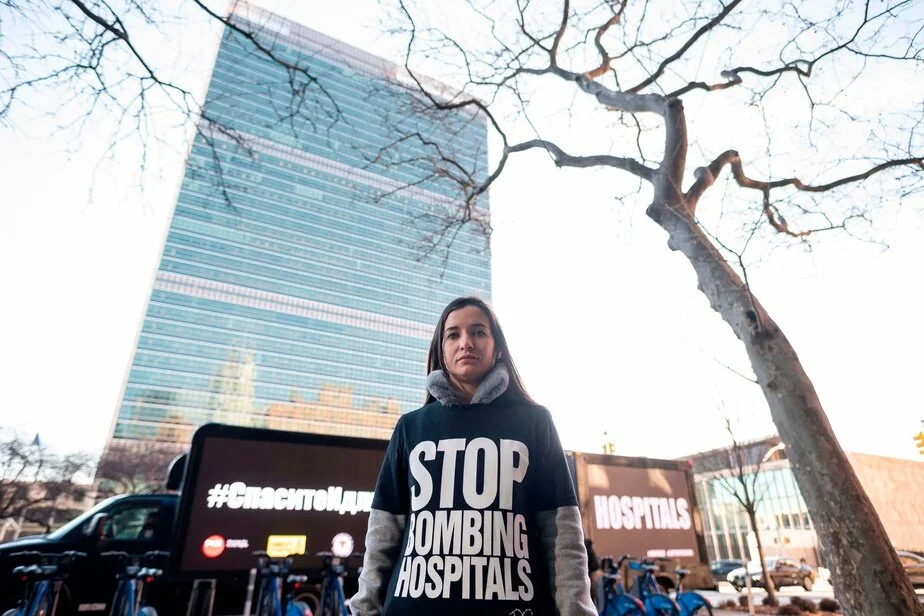








![People inspect destruction caused by government air raids in the town of Ariha, Idlib province [Ghaith Alsayed/AP Photo]](https://images.squarespace-cdn.com/content/v1/5dd2b54227235964a45338d6/1579185824342-YEJSDTGGFZW3WC2S75QE/8daba5d7b8ee49579d97645dcb1c1188_18.jpg)


